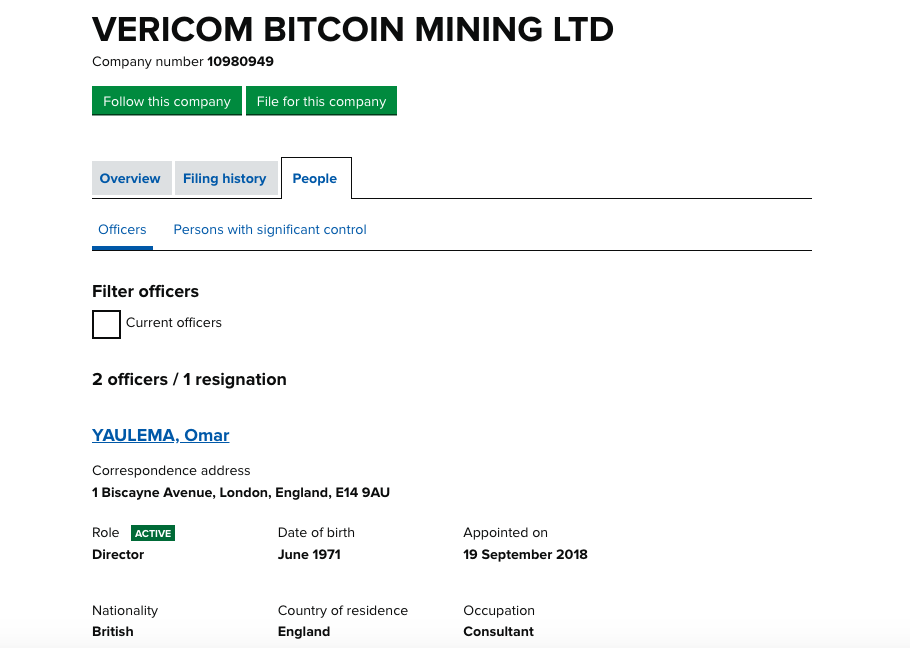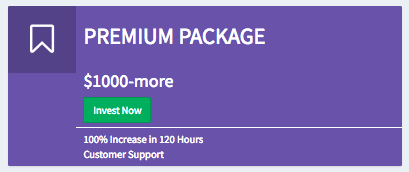In what appears to be an obvious Ponzi scheme, BTC-mining is offering investors as much as 200 percent interest on their investment in just five days — while providing absolutely no evidence to back up its claims.
The project joins the growing number of scam projects looking to capitalize on the recent growth of the cryptocurrency industry.
When it comes to Ponzi schemes, there are two major types:
- The kind that does everything in its power to appear legitimate — including paid testimonials, falsified statistics, and a somewhat-feasible business plan.
- The less-successful type that often does the absolute minimum to appear passable — typically providing very little or no information about exactly how they provide a return on investments.

Suspicious, Very Suspicious
When attempting to identify the exact strategy the project uses to offer such ludicrous returns, we discovered that the information was nowhere to be seen. Despite this complete lack of information, the website still claims to have sold out approximately 90 percent of its undefined sales cap — though, apparently, has more than 150 days left for its token sale. According to the project’s website, BTC-mining is a legally registered business in the UK, incorporated with company registration number 10980949 under the trading name Vericom Bitcoin Mining LTD. Looking at the company registration details, Vericom Bitcoin Mining LTD was incorporated in Sep 2017 — operating as a business and domestic software development company. Interestingly, the company was taken over by one Omar Yaulema in Sep 2018, just weeks before the web domain for BTC-mining was registered.
However, it may very well be that this is simply a legitimate business that has been co-opted without its consent. Whether or not the Vericom Bitcoin Mining LTD is truly associated with this shady operation remains to be seen. If it is, however, it will be legally liable for any claims it makes.
Looking at the company registration details, Vericom Bitcoin Mining LTD was incorporated in Sep 2017 — operating as a business and domestic software development company. Interestingly, the company was taken over by one Omar Yaulema in Sep 2018, just weeks before the web domain for BTC-mining was registered.
However, it may very well be that this is simply a legitimate business that has been co-opted without its consent. Whether or not the Vericom Bitcoin Mining LTD is truly associated with this shady operation remains to be seen. If it is, however, it will be legally liable for any claims it makes.
Elements of a Ponzi
As blockchain and cryptocurrencies have exploded in popularity as of late, an increasing number of fraudulent projects are cropping up — each looking to cash in on the hype and cash flow moving into the initial coin offering (ICO) space. Many of these projects are Ponzi schemes, which all have one thing in common —they offer of an unrealistic or unsustainable return on investment. In keeping with this unfortunate trend, BTC-mining offers as much as 200 percent interest within 120 hours for investments exceeding $1,000 or offers just 20 percent interest in 24 hours for investments up to $100. According to our calculations, investing $1,000 repeatedly in the $1,000+ plan would yield a staggering $728,000 within a month. Based on that ROI, it would take just under three months to earn $129 billion — currently more than the combined market capitalization of all cryptocurrencies. Of course, you wouldn’t want to be the very first person to invest in such a shady looking website, would you?Absolutely not! I need to see at least four testimonials first! – Nobody EverIn what appears to be a tradition with scam projects, BTC-mining has also decided to add several obviously-fake testimonials to the front page — featuring not-so-convincing reviews from the likes of ‘Henry Maddie’ and ‘Helen Jay.’
 In our humble opinion, these images look strikingly similar to the stock photos available on a variety of websites such as Shutterstock and iStockPhotos — the resemblance really is uncanny!
In our humble opinion, these images look strikingly similar to the stock photos available on a variety of websites such as Shutterstock and iStockPhotos — the resemblance really is uncanny!
 Rather than linking to a video description of the website, the play button next to the company registration details actually links to “Throwing Fire” by Ronald Jenkees. While we can’t fault the designer’s musical taste, we wonder what the throwing fire has to do with a Ponzi operation — unless it’s a clever reference to both throwing your money away and watching your finances go up in flames.
Rather than linking to a video description of the website, the play button next to the company registration details actually links to “Throwing Fire” by Ronald Jenkees. While we can’t fault the designer’s musical taste, we wonder what the throwing fire has to do with a Ponzi operation — unless it’s a clever reference to both throwing your money away and watching your finances go up in flames.
 Oh, and want to read the whitepaper? Well, there isn’t one! You’ll just have to trust the website’s ambiguous and far-fetched claims — as the whitepaper link is broken! If there was a whitepaper, however, we can bet that it would include a flurry of hyperbole and fictitious claims to appeal to our inherent greed.
Oh, and want to read the whitepaper? Well, there isn’t one! You’ll just have to trust the website’s ambiguous and far-fetched claims — as the whitepaper link is broken! If there was a whitepaper, however, we can bet that it would include a flurry of hyperbole and fictitious claims to appeal to our inherent greed.
Appeal to Greed
Unfortunately, one of the major factors behind a successful scam project is whether or not the crooks behind it can convince the reader that they will actually make money from the project. Among the most common strategies used by scammers is known as a high ú-yield investment program or HYIP. For the vast majority of cases, any project offering extremely high returns over a short period of time is what is known as a Ponzi scheme — a type of fraudulent business that uses money earned from later investors to pay the interest of early investments. One of the simplest signs of a Ponzi scheme or HYIP is a ridiculous interest rate. If a project is offering more than five percent per month in interest without an extremely strong business model to account for this, it’s probably too good to be true. For the vast majority of cases, any business guaranteeing more than ~5 percent per month ROI is likely to be some sort of Ponzi. Typically, projects look to justify the outrageous ROI they offer by using exaggerated claims and explanations of projected growth. Whenever a project uses extremely optimistic projections to validate its offer of high interest, you can be almost certain it’s a scam.
In some cases, however, it is not immediately obvious whether a project is a scam or not — while others can have all the traits of a Ponzi scheme but seemingly remain active for several years before finally collapsing. An excellent example of this is Bitconnect, a high-yield investment program that managed to survive for almost two years before closing down. Bitconnect offered its users up to 40 percent interest per month, plus an additional rate depending on the size of the investment — with this rate increasing with higher investments.
One of the most common strategies these scam attempts will use is incentivizing high investments with tiered rewards. This is done in an attempt to gain several large-scale investors, allowing those behind the scam to exit with a potentially hefty sum.
What do you think about BTC-mining? Is there any chance it is a legitimate enterprise? Have you ever lost money from a Ponzi scam? Let us know in the comments below!
Typically, projects look to justify the outrageous ROI they offer by using exaggerated claims and explanations of projected growth. Whenever a project uses extremely optimistic projections to validate its offer of high interest, you can be almost certain it’s a scam.
In some cases, however, it is not immediately obvious whether a project is a scam or not — while others can have all the traits of a Ponzi scheme but seemingly remain active for several years before finally collapsing. An excellent example of this is Bitconnect, a high-yield investment program that managed to survive for almost two years before closing down. Bitconnect offered its users up to 40 percent interest per month, plus an additional rate depending on the size of the investment — with this rate increasing with higher investments.
One of the most common strategies these scam attempts will use is incentivizing high investments with tiered rewards. This is done in an attempt to gain several large-scale investors, allowing those behind the scam to exit with a potentially hefty sum.
What do you think about BTC-mining? Is there any chance it is a legitimate enterprise? Have you ever lost money from a Ponzi scam? Let us know in the comments below!
Disclaimer
In adherence to the Trust Project guidelines, BeInCrypto is committed to unbiased, transparent reporting. This news article aims to provide accurate, timely information. However, readers are advised to verify facts independently and consult with a professional before making any decisions based on this content. Please note that our Terms and Conditions, Privacy Policy, and Disclaimers have been updated.

Daniel Phillips
After obtaining a Masters degree in Regenerative Medicine, Daniel pivoted to the frontier field of blockchain technology, where he began to absorb anything and everything he could on the subject. Daniel has been bullish on Bitcoin since before it was cool, and continues to be so despite any evidence to the contrary. Nowadays, Daniel works in the blockchain space full time, as both a copywriter and blockchain marketer.
After obtaining a Masters degree in Regenerative Medicine, Daniel pivoted to the frontier field of blockchain technology, where he began to absorb anything and everything he could on the subject. Daniel has been bullish on Bitcoin since before it was cool, and continues to be so despite any evidence to the contrary. Nowadays, Daniel works in the blockchain space full time, as both a copywriter and blockchain marketer.
READ FULL BIO
Sponsored
Sponsored

